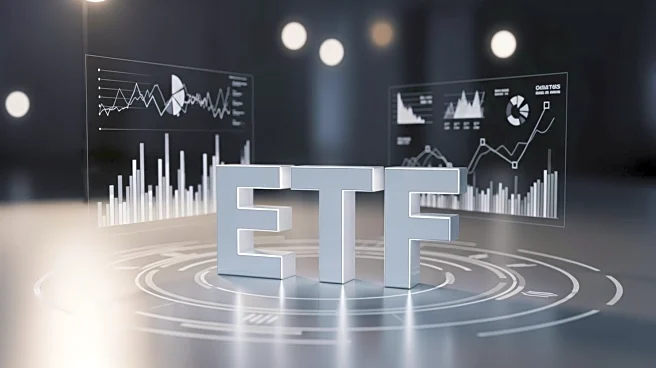What's Happening?
A recent survey conducted by Charles Schwab indicates that 45% of investors are showing interest in alternative assets, such as private equity, real estate partnerships, and hedge funds. Financial advisors
suggest that exchange-traded funds (ETFs) provide a straightforward way to access these alternative investments. The survey, which included 2,400 participants, highlights a growing trend among investors seeking to diversify their portfolios beyond traditional stocks and bonds. This shift is partly driven by younger investors who are increasingly disillusioned with conventional investment strategies, a phenomenon referred to as 'financial nihilism.' The survey also notes that regulatory changes and executive orders, such as those signed by President Trump, are making it easier for alternative products to be included in workplace retirement plans.
Why It's Important?
The increasing interest in alternative assets reflects a significant shift in investment strategies, as investors seek to diversify their portfolios and mitigate risks associated with traditional markets. ETFs offer a practical solution by providing liquidity and ease of access to these complex assets, which are typically less liquid and involve higher risks. This trend could lead to a broader acceptance and integration of alternative investments in mainstream financial planning, potentially reshaping the landscape of personal finance and investment advisory services. As more investors turn to alternatives, financial institutions may need to adapt their offerings to meet this demand, influencing the development of new financial products and services.
What's Next?
The growing interest in alternative assets is likely to prompt further innovation in the financial sector, with more ETFs being developed to cater to this demand. Financial advisors and institutions may focus on educating investors about the risks and benefits of alternative investments, ensuring informed decision-making. Regulatory bodies, such as the U.S. Securities and Exchange Commission, may continue to adjust policies to facilitate the inclusion of alternative assets in retirement plans and other investment vehicles. As the market evolves, investors can expect more opportunities to diversify their portfolios with alternative assets, potentially leading to increased market stability and resilience.
Beyond the Headlines
The shift towards alternative investments raises questions about the long-term implications for financial markets and economic stability. It challenges traditional investment paradigms and encourages a reevaluation of risk management strategies. The trend also highlights the need for financial literacy and education, as investors navigate the complexities of alternative assets. Additionally, it underscores the importance of regulatory oversight to ensure transparency and protect investors from potential pitfalls associated with these investments. As alternative assets gain popularity, they may influence broader economic trends, including capital allocation and market dynamics.









